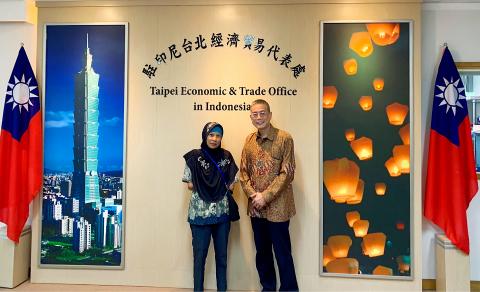Rusidah Badawi, an Indonesian photographer who was born without forearms, is to be one of the recipients of the 22nd Fervent Global Love of Lives Award at a ceremony in Taichung on Tuesday next week in recognition of her achievements and contributions to society.
The annual ceremony is organized by the Chou Ta-kuan Cultural and Educational Foundation to honor people from around the world nominated for their bravery in facing difficulties, making sacrifices, overcoming limitations or making a contribution to society.
The 51-year-old said that she often tells people: “You need to strive 99 percent on your own to succeed and rely 1 percent on others.”

Photo courtesy of the Chou Ta-Kuan Cultural and Educational Foundation via CNA
Born in 1968 in a remote village in Central Java’s Purworejo District, Badawi did not attend school until she was nearly nine years old.
When graduating from elementary school in 1983, Badawi finished 10th out of 120 students to gain admission to Bayan Purworejo Junior High School.
Transferring to Purworejo National Junior High School in 1984, she had to live at the Purworejo Wiloso Muda Mudi Orphanage for the next five years. She said that she made many friends there.
After high school, she enrolled in a photography course at the vocational school of the Soeharso Surakarta Rehabilitation Center in Solo, because she saw how a friend with only one hand made a living as a freelance photographer.
Hoping to earn some money, in 1991 she enrolled in a one-year photography training course and returned home with a certificate, Badawi said.
Working in Purworejo as a freelance photographer, Badawi used a modified camera with a screw on the shutter button to make it easier for her to operate.
“The screw was on the advice from my teacher at the time so I could stabilize the shot, so the photo would not come out blurry,” Badawi said, adding that she did not use it after switching to a digital camera.
Badawi was frequently invited to take photographs at weddings or other events and gained popularity across Indonesia.
Award founder Chou Chin-hua (周進華) said that Badawi’s photography has set an example for other people with disabilities, motivating them to not give up, but have the courage to learn a skill.
“Because of her work, we have invited her to speak to people in Taiwan who are going through difficult times, such as medical treatment, to motivate them to overcome hurdles,” Chou said.
The award was established by the parents of Chou Ta-kuan (周大觀), who died of cancer in 1997, to commemorate their son’s determination and love for life, while encouraging people to cherish and respect life.

Taiwanese can file complaints with the Tourism Administration to report travel agencies if their activities caused termination of a person’s citizenship, Mainland Affairs Council Minister Chiu Chui-cheng (邱垂正) said yesterday, after a podcaster highlighted a case in which a person’s citizenship was canceled for receiving a single-use Chinese passport to enter Russia. The council is aware of incidents in which people who signed up through Chinese travel agencies for tours of Russia were told they could obtain Russian visas and fast-track border clearance, Chiu told reporters on the sidelines of an event in Taipei. However, the travel agencies actually applied

Japanese footwear brand Onitsuka Tiger today issued a public apology and said it has suspended an employee amid allegations that the staff member discriminated against a Vietnamese customer at its Taipei 101 store. Posting on the social media platform Threads yesterday, a user said that an employee at the store said that “those shoes are very expensive” when her friend, who is a migrant worker from Vietnam, asked for assistance. The employee then ignored her until she asked again, to which she replied: "We don't have a size 37." The post had amassed nearly 26,000 likes and 916 comments as of this

New measures aimed at making Taiwan more attractive to foreign professionals came into effect this month, the National Development Council said yesterday. Among the changes, international students at Taiwanese universities would be able to work in Taiwan without a work permit in the two years after they graduate, explainer materials provided by the council said. In addition, foreign nationals who graduated from one of the world’s top 200 universities within the past five years can also apply for a two-year open work permit. Previously, those graduates would have needed to apply for a work permit using point-based criteria or have a Taiwanese company

The Shilin District Prosecutors’ Office yesterday indicted two Taiwanese and issued a wanted notice for Pete Liu (劉作虎), founder of Shenzhen-based smartphone manufacturer OnePlus Technology Co (萬普拉斯科技), for allegedly contravening the Act Governing Relations Between the People of the Taiwan Area and the Mainland Area (臺灣地區與大陸地區人民關係條例) by poaching 70 engineers in Taiwan. Liu allegedly traveled to Taiwan at the end of 2014 and met with a Taiwanese man surnamed Lin (林) to discuss establishing a mobile software research and development (R&D) team in Taiwan, prosecutors said. Without approval from the government, Lin, following Liu’s instructions, recruited more than 70 software